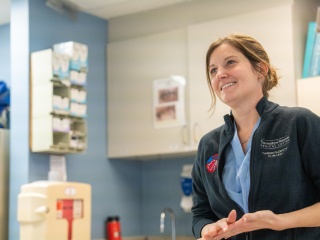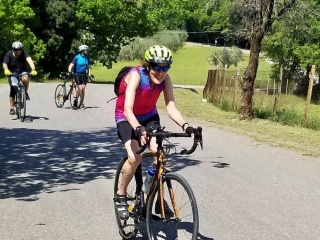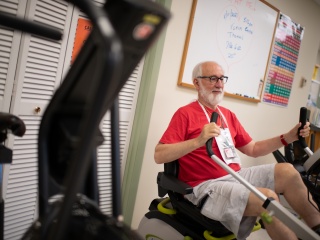Heart Attack
Heart Attack Care at UVM Health
With a heart attack, every second counts. Heart attacks, also known as myocardial infarctions, occur suddenly, when a blood clot or plaque (a buildup of fat and inflammatory tissue) in the coronary artery blocks the flow of oxygen-rich blood to the heart.
Patients suffering from a heart attack require emergency life-saving treatment to open up these blockages in their arteries. Each minute that your heart is deprived of oxygen increases your risk of permanent damage to the heart, resulting in disability or death.
If you or a loved one experience a heart attack, you want to be sure you’re in the care of skilled hands.

Why Choose UVM Health?
At University of Vermont Health, we take a coordinated, team-based approach to treating heart attacks. Our network of providers gives you access to advanced heart specialists, so no matter where you live in Vermont or northern New York, you can get personalized care to help you live a full and healthy life.
As one of the leading heart and vascular programs in the region, we offer:
- Excellent outcomes: We are a leader in cardiac care, with excellent outcomes for heart attack patients. Our regional network of advanced care, particularly for those who have experienced an ST-elevation myocardial infarction (STEMI) has helped Vermont rank in the top five states in the nation for heart attack survival.
- Advanced treatments: Our door-to-balloon times, from when a heart attack patient arrives in the emergency room to when we clear their blocked artery, are among the best in the country. Our cardiologists are also the only providers in Vermont offering catheter-based treatments of heart attack, performing approximately 1,200 of these procedures a year.
- Care grounded in research: We offer access to leading-edge technology and advanced treatments, including promising new therapies through clinical trials when appropriate.
They were so reassuring and made me feel so comfortable. I’m really grateful for their efforts. They saved my life.
What Causes a Heart Attack?
Heart attacks typically occur when a blockage prevents blood and oxygen from reaching the heart. This blockage is most often the result of coronary artery disease, in which fatty deposits (plaque) build up in the coronary arteries. If the plaque breaks open, the body will attempt to repair the artery and a blood clot may form, blocking blood flow.
More rarely, a heart attack may be caused by a severe artery spasm that narrows the coronary artery.
Several factors increase your risk of heart attack, including:
- Age (over 45 for men and over 55 for women)
- Smoking, or long-term exposure to secondhand smoke
- Diabetes
- High blood pressure
- High cholesterol
- A family history of heart attack
- Physical inactivity
- Obesity
- Stress
- Use of stimulating illegal drugs, such as cocaine or methamphetamines
Symptoms of a Heart Attack
The signs and symptoms of a heart attack vary depending on your sex.
In men, the most common signs of a heart attack include:
- Moderate to severe chest pain
- Dizziness
- Shortness of breath
- Nausea
- Radiating pain in the arms and chest
Most women experience the same symptoms as men, such as chest pain. However, women more often present with other symptoms, including:
- Pain in the back, arm, neck, shoulder and/or throat
- Vomiting
- Nausea
- Fatigue
- Shortness of breath
It is surprisingly common for people to experience no symptoms at all. This is especially true of diabetics, patients with a prior history of coronary artery bypass surgery, and those over the age of 75. We recommend that these individuals visit their family physician and/or cardiologist on a regular basis to continually monitor their health.
Do not ignore the signs of a heart attack. If you or someone you know are experiencing any of the above symptoms, immediately call 911.
A Smarter Way to Predict Heart Attack Risk
David Schneider, MD, is developing a new blood test that will revolutionize the way clinicians treat heart attack patients, giving them new data that will help better determine the need for powerful blood thinners, which can have dangerous side effects.
Diagnosing a Heart Attack
Most heart attacks are diagnosed in an emergency setting. Some diagnostics will be done in the ambulance on the way to the Emergency Department. Once you arrive at the hospital, a cardiac specialist will thoroughly assess your condition and determine the best course of treatment.
Heart attack diagnosis and testing may include:
- A physical exam: In which your provider will ask about your symptoms and check your vital signs
- Electrocardiogram (EKG): Records your heart’s electrical activity and identify any abnormal rhythms and stress to the heart. This test can show that a heart attack has occurred or is in progress.
- Blood tests: Shows if higher levels of certain enzymes, usually found in the heart muscle, have leaked into your blood
- Chest X-ray: Fully examines your heart and blood vessels and identify any damage that may have occurred
- Nuclear scan: Trace amounts of radioactive material is injected into your bloodstream and observed via special cameras, to identify regions of the heart muscle that are receiving inadequate blood flow
- Echocardiogram: Creates a video image of your heart and determine if it’s not pumping as it should
- Cardiac catheterization (angiogram): Identifies blocked or narrowed arteries using a long, thin tube (catheter), a special dye and imaging tools
- Stress tests: Compares the electrical activity of your heart before, during and after physical activity. These may be ordered in the weeks following your heart attack.
Heart Attack Treatment
If you experience a heart attack, you should immediately call 911. The dispatcher may direct you to chew aspirin to prevent blood clots from getting bigger or take other immediate steps to stop your condition from worsening.
Treatment will begin in the ambulance and will be continued in the emergency room by a team of cardiac specialists. Their goal will be to prevent lasting heart muscle damage by restoring blood flow to your heart as quickly as possible.
Treatments for heart attack can include:
Medications are critically important in treating heart attacks. Your doctor may prescribe one or more of the following:
- Aspirin: Inhibit blood clotting and maintain blood flow
- Thrombolytics: Help dissolve blood clots, usually at hospitals that are too far away from a hospital that offers coronary angioplasty
- Intravenous anticoagulants: Prevent new blood clots from forming
- Other oral medications in combination with aspirin, such as clopidogrel: Make your blood less likely to form clots
- Pain relievers, such as morphine: Reduce your pain levels
- Nitroglycerin: Temporarily widen blood vessels and improve blood flow to and from the heart
- Beta blockers: Decreases the demand on your heart, helping the heart muscle to relax, slowing your heart rate and lowering blood pressure
- Cholesterol-lowering medications, such as statins and niacin: Lowers levels of bad cholesterol
UVM Health offers minimally invasive, catheter-based procedures to treat your heart attack as quickly as possible. These procedures include:
- Angioplasty: Your cardiologist will insert a catheter with a special balloon into the coronary artery. The balloon is inflated to open up the artery and restore blood flow to the heart.
- Stenting: This procedure is typically performed alongside an angioplasty. This procedure involves your cardiologist using a catheter to insert a tiny wire mesh device (stent) into a blocked artery to keep it open, restoring blood flow to the heart.
Some patients who have experienced a severe heart attack may need open-heart surgery, most commonly a coronary bypass surgery. The cardiac surgeons at UVM Health have performed thousands of these life-saving heart surgeries.
In a coronary bypass surgery, your cardiac surgeon will remove a piece of a blood vessel from another part of your body, usually the chest or the leg. They use this new blood vessel to redirect blood flow around the narrowed or blocked portion of the coronary artery, restoring blood flow to the heart.
Wellness & Prevention
Evidence shows that proactive health care focused on preventing illness leads to better outcomes. We're here to help you live a healthier, happier life. We offer wellness and prevention services to empower you to take control of your health.

Locations Near You
Share your location to see nearby providers and availability
62 Tilley Drive
Suite 101
South Burlington, VT 05403
118 Tilley Drive
Suite 102
South Burlington, VT 05403-4450
115 Porter Drive
Middlebury, VT 05753
75 Park Street
Elizabethtown, NY 12932
101 Adirondack Drive
Suite 1
Ticonderoga, NY 12883
66 Park Street
Elizabethtown, NY 12932
133 Park Street
Malone, NY 12953
130 Fisher Road
Berlin, VT 05602
210 Cornelia Street
Ste 104
Plattsburgh, NY 12901
62 Tilley Drive
Suite 101
South Burlington, VT 05403-4407


